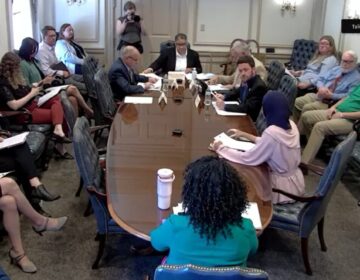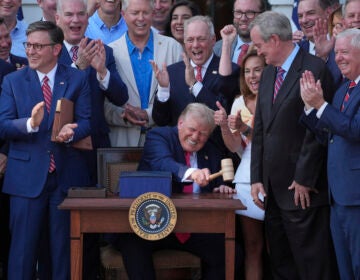My testimony supporting HB1506 to make English the official language of Pennsylvania
Pennsylvania House of Representatives
Committee on State Government
Hearing on House Bill 1506
11 a.m., September 21, 2015
Room G-50, Irvis Office Building, Harrisburg
Testimony of Jan C. Ting, Professor of Law
Temple University Beasley School of Law
I’m grateful to Chairman Metcalfe and all the members of the State Government Committee for the opportunity to offer testimony regarding House Bill 1506 designating English as the official language of the Commonwealth of Pennsylvania.
I’ve always thought it a fluke that the United States has no official language. Why didn’t the founding fathers specify an official language in the U.S. Constitution? They probably didn’t think of it, since they had other more difficult issues to work on. Or maybe they did think of it, but concluded an official language was unnecessary because it was so obvious that the Constitution itself and the Declaration of Independence were in English, and all the business of the new government and all of its states were conducted in English.
Regardless of the reason, the failure to designate an official language has allowed language minorities to demand translations of official documents and taxpayer funded translators in U.S. courts and other government institutions. Under the Voting Rights Act language minorities among U.S. citizens are entitled to vote on ballots translated into their own languages other than English.
In other countries with more than one official language, like Canada and Belgium, all government documents must be published in both official languages and government translators provided at all official functions. But that has not quelled separatist sentiment from flaring up along language lines, and on-going battles over public signage and what language to teach to newcomers.
The bureaucracy and parliament of the European Union, with its 23 official languages, is incurring high financial costs as it tries to translate every parliamentary bill and draft regulation into each language.
In the U.S. with no official language, every language is equally official. So it could be argued that we actually have more official languages than the European Union. What happens when civil and criminal defendants insist on trials conducted in their own equally official language? Such claims have been made and upheld in courts in Canada and other countries with more than one official language.[1]
That’s why a majority of the 50 states have designated English as their official language. Pennsylvania, and our neighboring states of New Jersey, Delaware, Maryland, Ohio, and New York are all in the minority of states without an official language. (Hawaii has designated both English and Hawaiian as official. Other states have recognized Native American languages, French (Louisiana), or Spanish (New Mexico) as having special status distinct from official English.) Bills to designate English as the official language of the United States are regularly introduced in Congress, but so far without sufficient support for passage.
House Bill 1506 designating English as an official language of the Commonwealth of Pennsylvania supports the argument that laws and other government enactments are legally sufficient and binding when enacted and published in English. Making English official does not preclude government from offering services in other languages if it chooses to do so. It does not outlaw the use of other languages. But it should limit taxpayer obligation to provide translation services to those areas where required for criminal justice or where specifically designated by legislation.
I support and encourage Americans to study foreign languages, both for their own individual enjoyment and benefit, and because it’s in the national interest for Americans to speak and do business with, and try to understand, people all over the world.
But having a single common language has always been a strength for a country as large as the United States. How else can Americans participate in public discussion of our common issues and problems?
As immigration becomes easier and more common, maintaining the American advantage of a single common language becomes more of a challenge. Designating English as our official language for our state, and hopefully someday soon for our nation, will fill the gap left by our founding fathers and should help to keep some of the language conflicts, divisions and costs experienced by Canada, Belgium, and the European Union away from our shores.
I again thank the chairman and the members of the committee for the opportunity to testify and express my support for House Bill 1506.
[1] See for example the Supreme Court of Canada case, Jean Victor Beaulac v. Her Majesty The Queen, 1 S.C.R. 768 (1999).
WHYY is your source for fact-based, in-depth journalism and information. As a nonprofit organization, we rely on financial support from readers like you. Please give today.




